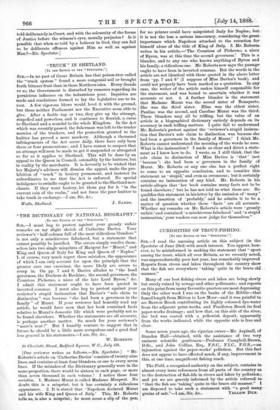"THE DICTIONARY OF NATIONAL BIOGRAPHY."
[TO THE EDITOR OF THE "SPECTATOR."]
SIR,—I must beg to protest against your grossly unfair remarks on my slight sketch of Catherine Davies. Your reviewer's "half-column full of the most ridiculous blunders" is not only a mischievous falsehood, but a statement that cannot possibly be justified. The errors simply resolve them- selves into two single misprints of Manprat for "Murat," and King and Queen of Italy for King and Queen of "Naples." I, of course, very much regret these mistakes, the appearance of which I can only account for upon the principle that the greater care one exercises, the more likely are errors to creep in. On pp. 7 and 8, Davies alludes to "the head governess, the Duchess de Rochino ; the second governess, the Countess Picherno, a niece of the late Lord Byron," &c. I admit this statement ought to have been quoted in inverted commas. I must also beg to protest against your reviewer's stupid insinuation that Davies's "sole claim to distinction" was because "she had been a governess in the family" of Murat. If your reviewer had honestly read my article, he would have seen that her book contained facts relative to Murat's domestic life which were probably not to be found elsewhere. Whether the statements are all accurate, is perhaps another matter. So much for your reviewer's "mare's nest !" But I humbly venture to suggest that in future he should be a little more scrupulous and a good deal less general in his statements.—I am, Sir, &c.,
W. ROBERTS.
10 Charlotte Street, Bedford Square, W.C., July 5th.
[Our reviewer writes as follows.—En. Spectator.] "Mr. Roberts's article on 'Catherine Davies' consists of twenty-nine lines, and contains at least four blunders, or one to every seven lines. If the mistakes of the Dictionary generally were in the same proportion, there would be sixteen to each page, or more than seven thousand in each volume ! I notice these four seriatim. 1. Madame Murat is called Madame lifauprat. No doubt this is a misprint, but it has certainly a ridiculous appearance. 2. It is stated that Napoleon declared Murat and his wife King and Queen of Italy.' This, Mr. Roberts tells us, is also a misprint ; he must mean a slip of the pen, for no printer could have misprinted Italy for Naples; but. it is not the less a serious inaccuracy, considering the great importance which Napoleon attached to the retention for himself alone of the title of King of Italy. 3. Mr. Roberta writes in his article,--' The Countess of Picherno, a niece of Byron, was at this time the second governess.' This is a blunder, and to any one who knows anything of Byron and his family, a ridiculous one. Mr. Roberts now says the passage ought to have been in inverted commas. But the words in the article are not identical with those quoted in the above letter from pp. 7 and 8' (I suppose of Miss Davies's book), and could not properly have been marked as a quotation. In any case, the writer of the article makes himself responsible for the statement, and was bound to ascertain whether it was accurate or not. 4. A further blunder is the statement that Madame Murat was the second sister of Bonaparte.. She was the third sister. Elisa was the eldest sister, Pauline was the second, and Caroline Murat was the third. These blunders may all be trifling, but the value of an article in a biographical dictionary entirely depends on its accuracy in such trifling matters. I quite fail to understand Mr. Roberts's protest against the reviewer's stupid insinua- tion that Davies's sole claim to distinction was because she had been a governess in the family of Murat.' I think Mr. Roberts cannot understand the meaning of the words he uses. What is the insinuation? I made as clear and direct a state- ment as I knew how to do. I wrote, as I still think, that the sole claim to distinction of Miss Davies is 'that' (not because ') she had been a' governess in the family of Murat. Mr. Roberts or any one else has a perfect right to come to an opposite conclusion, and to consider thin statement as stupid,' and even as erroneous ; but it certainly contains no insinuation of any kind. Mr. Roberts in. his. article alleges that her book contains many facts not to be found elsewhere ;' but he has not told us what these are. Re- qualifies this statement in his letter by the omission of 'many' and the insertion of probably,' and he admits it to be a matter of question whether these 'facts' are all accurate Whether my remarks on Mr. Roberts's article were grossly unfair,' and contained a mischievous falsehood' and a stupid insinuation,' your readers can now judge for themselves."


































 Previous page
Previous page